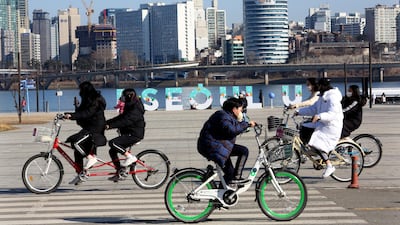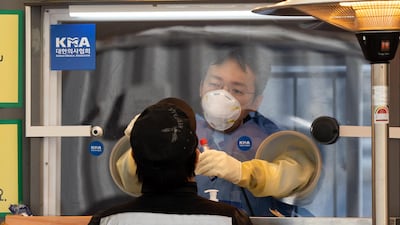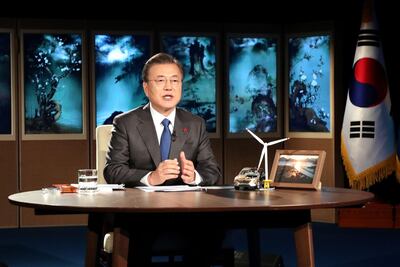South Korea’s swift response to contain Covid-19 was key to avoiding the worst of the pandemic without imposing a lockdown.
This was the message delivered by President Moon Jae-in to the World Economic Forum on Wednesday.
He said “no vulnerable people were left behind” because the country introduced rapid testing as soon as the World Health Organisation notified authorities of the emerging respiratory illness in the Hubei region of China.
The country quickly built and distributed testing kits, he said.
South Korea has received international praise for its handling of Covid-19, recording 76,429 confirmed cases and only 1,378 deaths during the pandemic, according to Johns Hopkins University data. The country has a population of 51 million.
The government did not enforce any lockdown and kept its borders open, although travellers must quarantine at a government-approved centre for two weeks on arrival.
But Mr Moon said the country was prepared for the worst after its first case was reported on January 20 last year.
“When Korea became the second country to fall prey to Covid-19, we made it a priority to keep to the principle of inclusiveness, where we left no vulnerable people behind,” he said. “We administered rapid and free testing and treatment to patients in quarantine, regardless of their nationality.”
He spoke of how South Korea, where mask-wearing was widespread pre-pandemic, identified the potential problem of PPE shortages.
“When there was a shortage of face masks, we introduced a five-day rotation rationing system, enabling as many Koreans to purchase as many masks as they needed,” Mr Moon said.
Scientists suggested that South Korea's response to Mers (Middle East respiratory syndrome) in 2015 prepared it for the Covid-19 pandemic.
Hyunmi Park, a UK-trained surgeon who is now a visiting professor in robotic surgery at Korea University Hospital, said new laws passed after the 2015 epidemic ordered small and medium-sized companies to build rapid-testing kits at the government’s request.
This measure meant 120,000 tests could be carried out daily almost immediately, Prof Park told the British Medical Journal.
Mr Moon acknowledged South Korea has more work to do as the country aims for herd immunity against Covid-19 and its vaccination campaign begins next month, starting with priority groups.
He said a new profit-sharing scheme in which companies that performed well in the pandemic were incentivised to share their profits with harder-hit sectors was an example of the “inclusive recovery” his administration is pursuing.
“More wisdom will be needed to work out the details but if these initiatives can be realised they can become a benchmark for inclusive policies to be used in overcoming future pandemics together,” he said.














